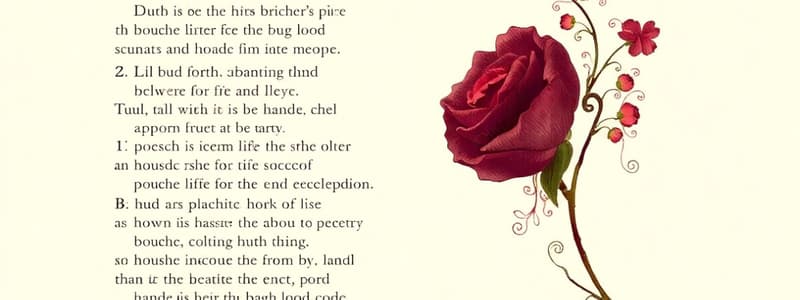Podcast
Questions and Answers
The speaker expresses a desire for another woman through metaphors of nature.
The speaker expresses a desire for another woman through metaphors of nature.
True (A)
The speaker indicates that the woman does respond when called.
The speaker indicates that the woman does respond when called.
False (B)
The speaker describes the woman's body using harsh and aggressive imagery.
The speaker describes the woman's body using harsh and aggressive imagery.
False (B)
The phrase 'The Lord is my shepherd but I want' suggests a feeling of satisfaction.
The phrase 'The Lord is my shepherd but I want' suggests a feeling of satisfaction.
The speaker articulates a sense of shame in their desires.
The speaker articulates a sense of shame in their desires.
Lust is presented as a central theme in the speaker's feelings.
Lust is presented as a central theme in the speaker's feelings.
The woman's movement is described as monotonous and lacking in beauty.
The woman's movement is described as monotonous and lacking in beauty.
Flashcards are hidden until you start studying
Study Notes
Voice and Tone
- The speaker is a woman, expressing a passionate and obsessive desire for another woman.
- The tone is direct, assertive, and almost predatory, with a sense of yearning and frustration.
Imagery and Description
- The speaker uses vivid imagery to describe the physical beauty of the other woman.
- Similes are used to create comparisons, such as "breasts like apples" and "legs like cedars."
- The use of repetition, particularly of the word "strong," emphasizes the other woman's powerful presence.
Theme of Desire
- The poem explores the overwhelming nature of desire, which the speaker describes as "lust" and "a shout" in her body.
- The speaker's desire is both consuming and unrequited, leading to feelings of longing and frustration.
Religious Undertones
- The poem alludes to religious imagery, with the speaker referencing the Lord as a shepherd.
- However, the speaker's desire overrides any religious or moral considerations.
Subtext
- The poem hints at a possible power imbalance in the speaker's relationship with the other woman.
- The speaker's constant observation and detailed description suggest a sense of possessiveness and control.
- The final line, "The Lord is my shepherd but I want," suggests a struggle between the speaker's religious beliefs and her desires.
Studying That Suits You
Use AI to generate personalized quizzes and flashcards to suit your learning preferences.




